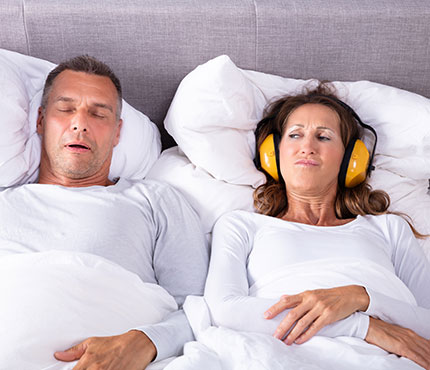We all know that sleep apnea causes many an uncomfortable night. Noisy snoring, gasping for breath, and waking up dozens of times a sleep cycle are the unhappy consequences of Obstructive Sleep Apnea (OSA). What you may not realize is that sleep apnea can pose serious risks to your health.
Obstructive sleep apnea is caused by an obstructed airway. The throat muscles may relax as you sleep and make it impossible to inhale fully with each breath. Or you may have a physical condition such as a deviated septum, enlarged tonsils or excess throat tissue that blocks the free passage of air into your lungs.
As a result, you stop breathing for a short time and often choke or gasp for breath. Your body responds by waking every time you need to start breathing properly again, and this can happen dozens of times each hour you are asleep. The result is that, while you may think you have slept through the night, you have never gotten the deep sleep your body needs to restore itself.
How can sleep deprivation affect our daytime health? You might find yourself suffering from one or more of these problems:
- Constant drowsiness
- Falling asleep at work or while driving
- Morning headaches
- Sore throat
- Dry mouth (which can lead to gum and dental problems)
- Memory and attention problems
- Moodiness or depression
- Decreased libido
As if these reasons weren’t cause enough to find a solution to your sleeping disorder, the longer term results of OSA can be devastating. Many serious conditions and consequences have been linked to sleep apnea, including:
- High blood pressure
- Heart disease
- Stroke
- Dangerous reactions to medication
- Problems with general anesthesia
- A higher risk of accidents
An oral and maxillofacial surgeon is uniquely qualified to diagnose and treat your sleep apnea. Oral and maxillofacial surgeons have a minimum of four years of advanced studies in a hospital-based residency program, where they train with medical residents in the fields of general surgery, anesthesiology, internal medicine, and other specialties with a specific focus on the bones, muscles, nerves, and skin of the face, mouth, and jaw.
An oral surgeon might suggest a number of non-surgical options to help reduce or eliminate the snoring and other unpleasant results of OSA. Successful outcomes might be achieved by:
- Behavior Modification—weight loss counseling, change of sleep position, avoiding alcohol and specific medications, and other lifestyle changes.
- Oral Appliances—there are many different appliances approved for treating OSA. They look and function much like mouthguards and other oral appliances.
- Positive Airway Pressure Machines—these machines, used with a breathing mask, are most commonly prescribed for those who suffer from moderate or severe OSA.
In more serious cases, your oral surgeon might recommend a surgical option. There are several surgical procedures used to treat OSA, because each patient has unique throat, nose, and jaw structures, with unique airway flow patterns and obstructions. Potential surgical treatments include:
- Palate surgery—excess tissue is removed or reduced in the soft palate, uvula, tonsils, and other areas of the pharynx (the back of the roof of the mouth) that are obstructing air flow.
- Hyoid advancement—in this procedure, the hyoid bone, a small bone located above the Adam’s apple, is secured to the thyroid cartilage to stabilize and expand the airway.
- Tongue surgery—depending on the problem, surgery can reduce the size of the tongue’s base or advance its position in the mouth in order to reduce obstruction.
- Jaw surgery—for some patients with small jaws and severe sleep apnea, surgery can be performed to move the upper and lower jaws forward to create a larger airway.
These and other options might be recommended based on the severity of your sleep apnea and your individual needs and anatomy. An oral surgeon is uniquely qualified to provide an expert diagnosis of your condition and to recommend the most effective treatment for your OSA, whether surgical or non-surgical.
Sleep apnea doesn’t just ruin your night—it can have serious and even life-threatening consequences. If you suffer from any of the symptoms of sleep apnea, please give us a call. If obstructive sleep apnea is making your nights miserable, we can work with you to find a solution that will improve your health—and your quality of life—24 hours a day.



